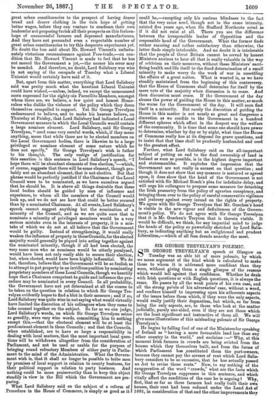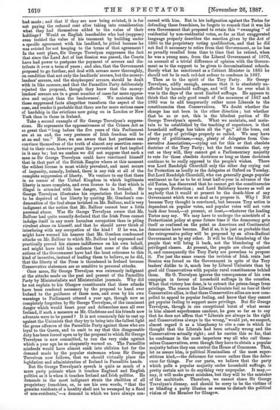SIR GEORGE TREVELYAN'S POLEMIC.
SIR GEORGE TREVELYAN'S speech at Glasgow on Tuesday was an able bit of mere polemic, by which. we mean argument of the kind which is calculated to make those to whom it is addressed more confident than they were, without giving them a single glimpse of the reasons which would tell against that confidence. Whether he deals with Irish questions or with English questions, it is always the same. He passes by all the weak points of his own case, and all the strong pints of his adversaries' case, without a word, and confines himself to impressing upon his adherents aspects of the issues before them which, if they were the only aspects, would really justify their dogmatism, but which, so far from being the only aspects, are, to those who look at the matter judicially, purely one-sided, even if they are not those which are the least significant and instructive of them all. We will give some illustrations of this misleading polemic of Sir George Trevelyan's.
He begins by falling foul of one of the Ministers for speaking of Ireland as "having a more favourable land law than any
other country in the world," and exclaims Why, at this moment Irish farmers in crowds are being evicted from the houses which they themselves built, and from the farms of which Parliament has ,constituted them the part-owners, because they cannot pay the arrears of rent which Lord Salis- bury considers to be so excessive, that he has actually passed an Act to revise those rents." Now, to say nothing of the exaggeration of the word "crowds," what are the facts which. Sir George Trevelyan suppresses in this sentence, and which vitally affect the conditions of the case he is arguing 1 Why, first, that so far as these farmers had really built their own houses, their rent had been reduced under the Land Act of 1881, in consideration of that and the other improvements they
had made ; and that if they are now being evicted, it is for not paying the reduced rent after taking into consideration what they had themselves added to the value of their holdings I Would an English leaseholder who had (suppose) even trebled the value of his tenement by building under a specific agreement with his landlord, be pitied because he was evicted for not keeping to the terms of that agreement? In the next place, Sir George Trevelyan suppresses the fact that since the Land Act of last Session was passed, the Courts have had power to postpone the payment of arrears and dis- tribute it over a term of years ; and also, that the Government proposed to go further, and deal with arrears more thoroughly, on condition that not only the landlords' arrears, but the money- lenders' arrears, and the shopkeepers' arrears, should be dealt with in like manner, and that the Parnellite Party deliberately rejected the proposal, though they knew that the money- lenders' arrears are in a great number of cases far more oppres- sive and unjust than the landowners'. We maintain that these suppressed facts altogether transform the aspect of the case, and render it probable that there are far more serious cases of hardship in the evictions now going on in London or New York than in those in. Ireland.
Take a second example of Sir George Trevelyan's suppres- sions. He represents the oppressiveness of the Crimes Act as so great that "long before the five years of this Parliament are at an end, the very pretence of Irish freedom will be at an.end too." Now, we are aware that hot partisans can convince themselves of the truth of almost any assertion essen- tial to their case, however great the perversion of fact implied in it may be; but we confess we did not suppose that such a man as Sir George Trevelyan could have convinced himself that in that part of the British Empire where at this moment the wildest license is most widely prevalent, and most secure of impunity, namely, Ireland, there is any risk at all of the complete suppression of liberty. We venture to say that there is no corner of the United Kingdom in which legitimate liberty is more complete, and even license to do that which is illegal is attended with less danger, than in Ireland. Sir George. Trevelyan illustrates his expectation that Ireland is to be deprived of her liberty by quoting Mr. Goschen's con- demnation of the foul abuse lavished on Mr. Balfour, and is very indignant at the notion that Mr. Balfour cannot bear a little personal abuse. Was Sir George Trevelyan aware that Mr. Balfour had quite recently declared that the Irish Press cannot indulge itself in any more harmless occupation than in piling virulent abase on himself, and that he should never think of interfering with any occupation of the kind ? If he was, he might have warned his hearers that Mr. Gosohen condemned attacks on Mr. Balfour to which Mr. Balfour had expressed and practically proved his sincere indifference on his own behalf, and might have told his audience that none of the official actions of the Government have had the least reference to this kind of invective, instead of leading them to believe, as he did, that-the liberty of the Press is threatened in Ireland because Conservative statesmen are so sensitive to personal attacks.
Once more, Sir George Trevelyan was extremely indignant at the attacks made on the past and present of the Parnellite Party-by Ministerialists and Ministerialist journals. Why did he not explain to his Glasgow constituents that these attacks have been rendered necessary by the proposal to hand over Ireland to the guidance of these men, and even by his own warnings to Parliament uttered a year ago, though now so completely forgotten by Sir George Trevelyan, of the imminent danger which would beset poor and defenceless men all over Ireland, if such a measure as Mr. Gladstone and his friends now advocate were to be passed I It is not commonly fair to cast up against the Unionists that they try to bring into the fullest light the gross offences of the Parnellite Party against those who are loyal to the Queen, and to omit to say that this disagreeable duty has been forced upon us by the proposal to which Sir George Trevelyan is now committed, to run the very risks against which a year ago he so eloquently warned us. The Parnellite misdeeds would have almost sunk into oblivion but for the demand made by the popular statesman whom Sir George Treve]van now follows, that we should virtually place the legislation and administration of Ireland in Parnellite hands.
But Sir George Trevelyan's speech is quite as much of a mere party polemic when it touches England and English politics as it is when it touches Ireland and Irish polities. He demands in the most indignant strain the abolition of all proprietary franchises, or, to use his own words, "that the genuine residents of a locality shall not be swamped by a flood of non-residente,"—a demand in which we have always con-
curred with him. But in his indignation against the Tories for defending these franchisee, he forgets to remark that it was his own Government that proposed to retain this " swamping " of residential by non-residential votes, so far as that exaggerated language properly describes the sanction given by the Act of 1885 to the proprietary voting qualification, and that he did not find it necessary to retire from that Government, as he has so proudly recalled from time to time that he retired, when he was a young man, from the Liberal Government of 1870, on account of a trivial difference of opinion with the Govern- ment as to the support to be given to denominational schools. Surely what he sanctioned as a Cabinet Minister in 1885 he should not be in such red-hot ardour to condemn in 1887.











































 Previous page
Previous page